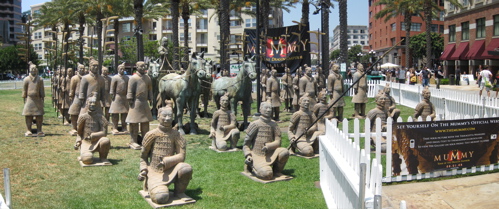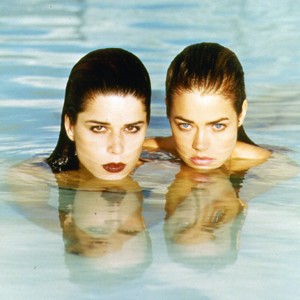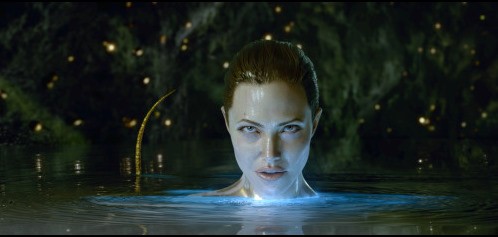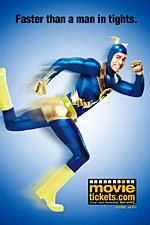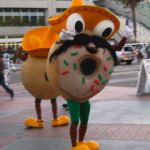 As Comic-Con International strains at the boundaries of the San Diego Convention Center, it’s begun spilling over into the city. Go back 4-5 years, and the most you would see would be the occasional street light banner or bus stop advertisement. Now, there are people handing out flyers as far out as the trolley stops, and walking around the Gaslamp in ridiculous mascot costumes (the sandwiches a few years ago, the donuts this year). There are displays near the trolley stops. There are buses wrapped with full advertisements for movies and TV shows, shuttle vans labeled U.S.S. Enterprise — there was even an ice cream truck parked for several days on 5th street with a Eureka ad on the side (and probably something inside it, but I was always on the other side of the street when I saw it).
As Comic-Con International strains at the boundaries of the San Diego Convention Center, it’s begun spilling over into the city. Go back 4-5 years, and the most you would see would be the occasional street light banner or bus stop advertisement. Now, there are people handing out flyers as far out as the trolley stops, and walking around the Gaslamp in ridiculous mascot costumes (the sandwiches a few years ago, the donuts this year). There are displays near the trolley stops. There are buses wrapped with full advertisements for movies and TV shows, shuttle vans labeled U.S.S. Enterprise — there was even an ice cream truck parked for several days on 5th street with a Eureka ad on the side (and probably something inside it, but I was always on the other side of the street when I saw it).
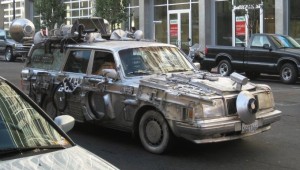
It’s mainly the TV and film studios (except for the flyers), and it ties into something that author Robert J. Sawyer mentioned at his spotlight panel: Convention-goers are nexuses (well, nexi). We’re the people who are so into movies, TV, games, comics, etc. that we’ll put in the effort, time and expense to go to this kind of event, and we’re likely to talk about it. They’re counting on us going back to our offices or dorm rooms, hanging out with friends, blogging, posting on Twitter, or otherwise telling everyone we know about how cool this and that new movie is going to be.
In short: It’s an advertising blitz designed to kick off word-of-mouth hype, aimed at the crowd that’s both most primed to receive it and most likely to spread it.
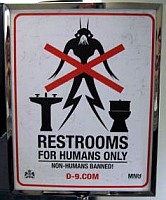
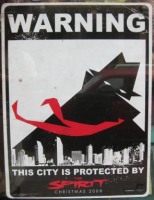 With the massive convention floor and unbelievable crowds, they’re doing everything they can to stand out. So we get the viral marketing, like the ads for TruBlood, the Humans-Only Restrooms signs, the army of people in Quarantine outfits, the Neighborhood Watch–style sign for The Spirit. We get the swag. We get the celebrity appearances. We get displays of terra-cotta warriors to advertise The Mummy and replicas of the Owlship from Watchmen.
With the massive convention floor and unbelievable crowds, they’re doing everything they can to stand out. So we get the viral marketing, like the ads for TruBlood, the Humans-Only Restrooms signs, the army of people in Quarantine outfits, the Neighborhood Watch–style sign for The Spirit. We get the swag. We get the celebrity appearances. We get displays of terra-cotta warriors to advertise The Mummy and replicas of the Owlship from Watchmen.
All that brings in more people, which of course makes the event more attractive to the studios, so they put in more effort, which brings in more people, and they start promoting movies that have nothing to do with comics, sci-fi, fantasy or horror, the genres that used to be the main focus for the con. (I remember thinking that Harold and Kumar Go to White Castle was an odd choice to promote at Comic-Con. This year, the sequel blended right in.)
The con seems to have reached an upper limit in terms of the number of people it can handle at the current venue, which is contracted through 2012. I wonder whether Hollywood will demand bigger crowds — which would probably be best handled by spilling into neighboring hotels — or be satisfied with the numbers it’s got.
